We may not have the course you’re looking for. If you enquire or give us a call on +352 8002-6867 and speak to our training experts, we may still be able to help with your training requirements.
Training Outcomes Within Your Budget!
We ensure quality, budget-alignment, and timely delivery by our expert instructors.
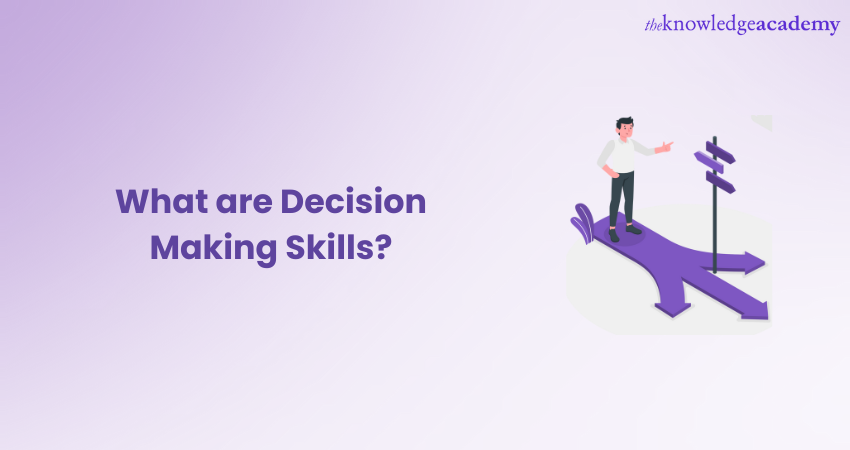
Life is a series of crossroads, each demanding a choice. Whether it’s pondering breakfast options or charting a career path, our decisions shape our journey. But how do we become adept decision makers? Fear not! In this blog, we’ll unravel the secrets, from dissecting problems to weighing alternatives. Buckle up, and let’s master the art of Decision Making Skills!
Table of Contents
1) What are Decision Making Skills?
2) Types of Decision Making Skills
3) The Decision Making Process
4) How to Improve Decision Making Skills?
5) How to Demonstrate Decision Making Skills in an Interview?
6) Conclusion
What are Decision Making Skills?
Decision Making Skills are the abilities used to choose the best course of action from several alternatives in any situation. These skills involve critical thinking, problem-solving, analysis, and evaluation. Effective Decision Making requires understanding a situation, considering potential outcomes, weighing the risks and benefits, and confidently choosing the best solution.
Good Decision Makers can assess situations, avoid biases, and often use logical reasoning to reach conclusions that lead to positive results in both personal and professional contexts. These skills are crucial for leadership, management, and everyday life, helping individuals navigate complex situations with clarity and effectiveness.

Types of Decision Making Skills
Not every individual is equipped with all types of skills. These abilities can differ across Decision Makers. Let's discuss them in detail:
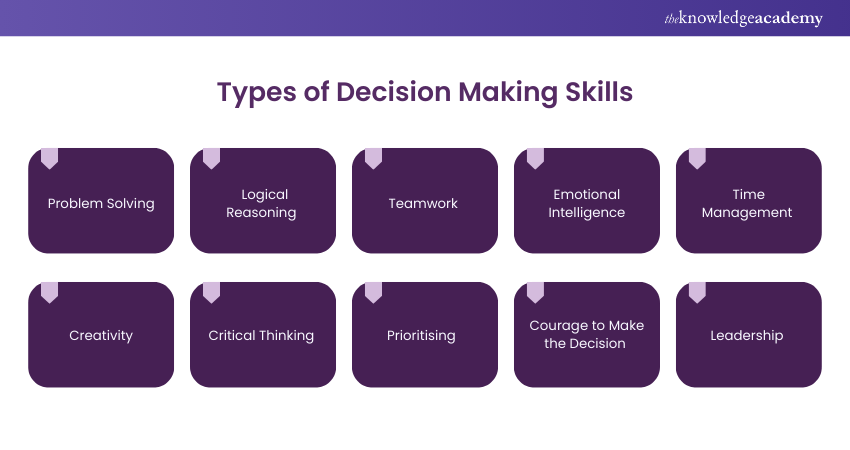
Problem Solving
Problem Solving is finding solutions to difficult or complex issues. It involves understanding the problem, brainstorming possible solutions, and choosing the best one. Good problem solving skills help you make effective decisions and overcome challenges. Practising them regularly improves your ability to handle unexpected situations.
Logical Reasoning
When it comes to Decision Making Skills, it’s necessary to review all pros and cons of the decision before taking any action on it. This skill is called reasoning. It is always suggested to reason with the present and the plan for the future while going through Decision Making Process. All available and relevant facts and data should be considered. So, the main motive of reasoning is to break down the options.
Teamwork
Team leaders need to engage their employees while making business decisions. Employees can express criticism of their ideas or devise new ideas that will enhance their Decision Making Skills. Consider an example of a marketing team led by a team leader, where they can exchange ideas to boost their sales revenue. They can also collaboratively work with other employees in the decision making process to convince them to buy into their decisions.
Emotional Intelligence
Emotional Intelligence is another key facet of Decision Making Skills. It makes people aware of their emotions and the ability to put them in a way that encourages action. Emotions lay the groundwork for inspiration regarding any action to be taken. The way you analyse problems is going to determine how well-informed you are when making the final decision.
Time Management
Time management is the ability to use your time efficiently and effectively. It involves planning, setting goals, and prioritising tasks to make the best use of your available time. Good time management skills help you meet deadlines and reduce stress. Practising time management regularly can improve your productivity and decision making abilities.
Creativity
Creative minds can certainly improve their Decision Making Skills. Creativity should be used to get the full benefits of logical and emotional thinking and to reach a unique solution. Creativity is also a skill that can be acquired. Exchanging ideas with each other can enhance this skill to come up with short and long-term solutions.
You can use the interactions that you have with other people to enhance your creativity. But for this, it’s necessary that everyone’s voice is heard. This is why regular meetings, brainstorming sessions and conversations are suggested to maximise the level of creativity.
Critical Thinking
Critical thinking is the ability to analyse information and make a reasoned judgment. It involves evaluating evidence, recognising biases, and considering different perspectives. Good critical thinking skills help you make more informed and effective decisions. Regularly practising thinking can improve your problem-solving abilities and decision making process.
Prioritising
Prioritising is deciding which tasks or issues are most important and need attention first. It helps you manage your time and resources effectively. Good prioritising skills ensure that important tasks are completed on time. Practising regular prioritising can improve your productivity and decision making efficiency.
Courage to Make the Decision
Courage to make the decision means being brave enough to make choices, even when they are difficult or uncertain. It involves trusting your judgment and accepting the consequences of your decisions. Having courage in decision making helps you take decisive action and move forward. Building this courage over time can lead to better and more confident decision making.
Leadership
Leadership is the ability to guide, motivate, and inspire others towards achieving common goals. It involves making decisions that benefit the team and organisation. Good Leadership skills include effective communication, empathy, and the ability to delegate tasks. Practising leadership can enhance your decision making abilities and help you manage teams more effectively.
Master the strategies to lead high-performing teams for exceptional success with our High Performing Teams Training – join now!
The Decision Making Process
The Decision Making process typically involves several steps:
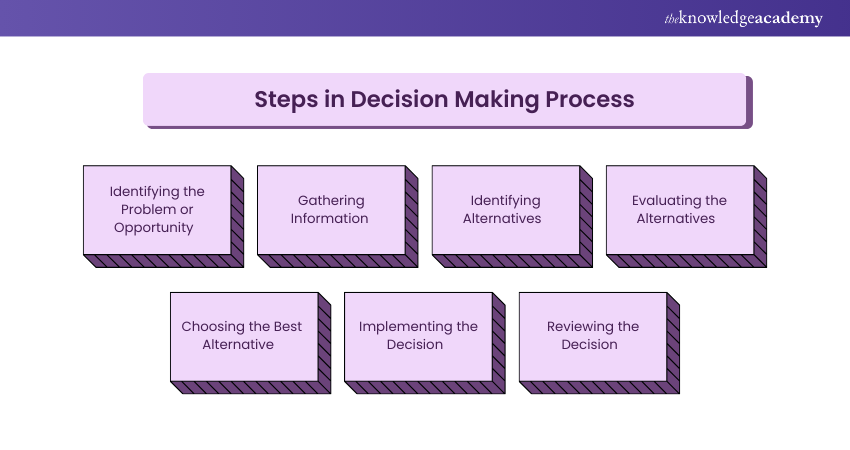
1) Identifying the Problem or Opportunity
a) Start by identifying the problem you need to solve or the question you need to answer.
b) Define the decision clearly and ensure the problem is specific and not too broad.
c) If there’s a specific goal tied to the decision, make it measurable and time-bound.
2) Gathering Information
a) Collect all necessary data related to the decision, including internal assessments of past successes and failures.
b) Seek insights from external sources like studies, market research, or consultants if needed.
c) Be careful about information overload, as too much data can complicate the Decision Making process.
3) Identifying Alternatives
a) With the gathered information, outline all possible solutions or courses of action.
b) Consider different strategies to meet your goal. For instance, if the goal is boosting social media engagement, alternatives could include paid ads, refining your organic strategy, or using a combination of both.
4) Evaluating the Alternatives
a) Evaluate the pros and cons of each alternative.
b) Examine similar scenarios from other organisations and review your own company’s history of wins and losses.
c) Identify the risks and rewards associated with each option and consider potential pitfalls.
5) Choosing the Best Alternative
a) After analysing all the alternatives, make your decision.
b) Ensure you’ve clearly defined the decision, reviewed all relevant information, and thoroughly weighed each potential option.
6) Implementing the Decision
a) Implement the decision by creating a detailed action plan.
b) Assign specific tasks to your team members to execute the plan and ensure the decision becomes a reality.
7) Reviewing the Decision
a) After a set period of time (established in the first step), review the outcome of your decision.
b) Reflect on whether you solved the problem, answered the question, or met the goals.
c) If successful, note the key factors for future decisions. If not, learn from any mistakes and refine the process for next time.
Elevate your Leadership skills to lead with confidence and empower your team with our Leadership Skills Training - sign up now!
How to Improve Decision Making Skills?
Improving Decision Making Skills can significantly enhance both personal and professional life. Here are some effective strategies:
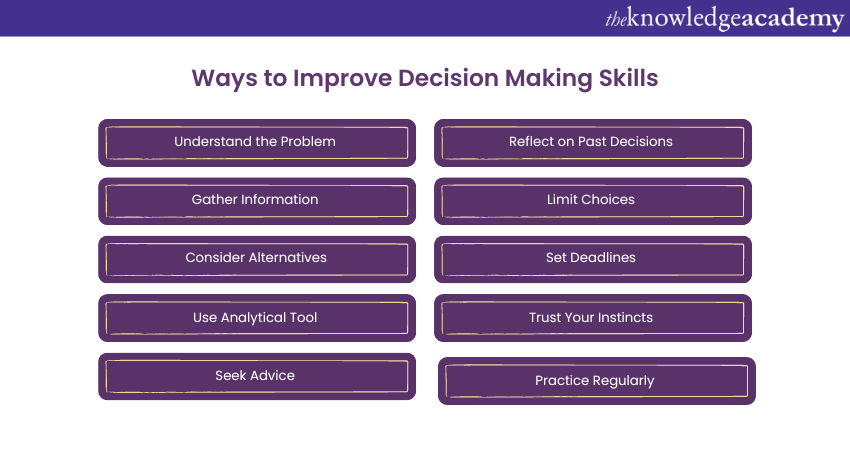
a) Understand the Problem: Clearly defining the problem helps in identifying the core issue. Breaking it down into parts can make it manageable. This clarity is crucial for effective decision making.
b) Gather Information: Collecting relevant data provides a solid foundation for your decision. It helps in understanding the context and potential outcomes. The more informed you are, the better your decisions will be.
c) Consider Alternatives: Identifying different options broadens your perspective. Evaluating the pros and cons of alternative helps in making a more informed choice. This step ensures you don’t overlook any potential solutions.
d) Use Analytical Tools: Techniques like SWOT analysis can systematically evaluate options. Decision matrices help in comparing different choices based on specific criteria. These tools provide a structured approach to decision making.
e) Seek Advice: Asking for input from others can provide new insights. People with experience or expertise can offer valuable perspectives. This approach can lead to better decisions.
f) Reflect on Past Decisions: Analysing previous decisions helps in understanding what worked and what didn’t. This reflection provides valuable insights for future decisions. Learning from past experiences is key to improvement.
g) Limit Choices: Too many options can lead to decision paralysis. Narrowing down your choices to a manageable number simplifies the process. This focus helps in making quicker and more confident decisions.
h) Set Deadlines: Establishing a timeframe for making the decision helps in avoiding procrastination. Deadlines keep the process moving and ensure timely decisions. This discipline is crucial for effective decision making.
i) Trust Your Instincts: Sometimes, your gut feeling can guide you, especially when you have experience in the area. Intuition is a powerful tool in decision making. Trusting yourself can lead to confident and effective choices.
j) Practice Regularly: Like any skill, decision making improves with practice. Starting with smaller decisions and gradually taking on more complex ones builds confidence. Regular practice helps in honing your decision making abilities.
Transform your business strategies with cutting-edge innovation techniques in this Business Model Innovation Training – register now!
How to Demonstrate Decision Making Skills in an Interview?
Demonstrating Decision Making Skills in an interview is crucial for showcasing your ability to handle complex situations effectively. Here are some tips to help you:
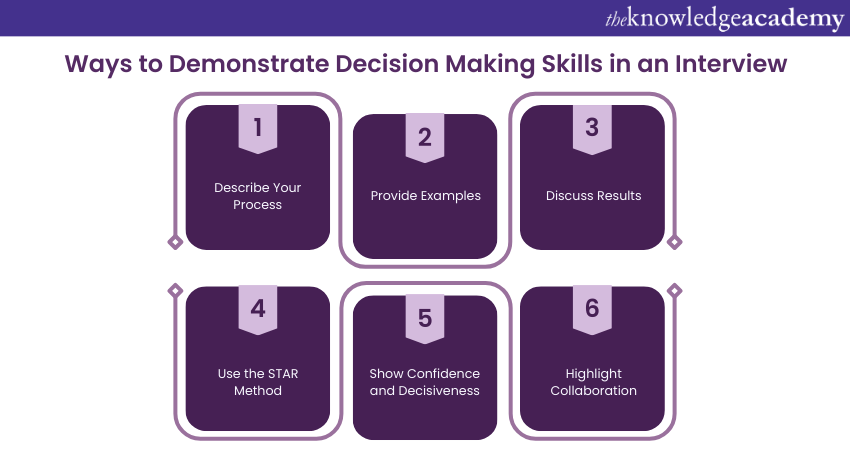
a) Describe Your Process: Explain the steps you take when making decisions. Mention how you gather information, evaluate options, and consider potential outcomes. This shows that you have a structured approach to decision making.
b) Provide Examples: Use Decision Making examples from your past experiences to illustrate your Decision Making Skills. Describe a situation where you had to make a tough decision, the process you followed, and the outcome. This helps the interviewer see your skills in action.
c) Discuss Results: Highlight the positive results of your decisions. Whether it was solving a problem, improving efficiency, or achieving a goal, discussing the outcomes demonstrates the effectiveness of your decision making.
d) Use the STAR Method: Structure your answers using the STAR method (Situation, Task, Action, Result). This helps in providing clear responses that are easy for the interviewer to follow.
e) Show Confidence and Decisiveness: Be confident in your responses and show that you can make decisions under pressure. Employers look for candidates who can handle uncertainty and make informed choices.
f) Highlight Collaboration: Mention how you involve others in the decision making process. This shows that you value teamwork and can leverage different perspectives to make better decisions.
Learn how to make important decisions effectively with our Decision Making Course join now!
Conclusion
Mastering Decision Making Skills is essential for both personal and professional growth. By honing abilities such as problem-solving, logical reasoning, teamwork, and Emotional Intelligence, individuals can make more informed choices. Continuous improvement of these skills leads to better decision-making and long-term success in any field.
Take the next step in developing your Leadership skills by registering for our Leadership Courses now!
Frequently Asked Questions

Effective decision making enhances job opportunities and career advancement. It demonstrates problem-solving abilities, Leadership, and critical thinking. These are essential qualities that employers seek for higher roles and professional growth.

Employees can enhance decision making by improving critical thinking and seeking diverse perspectives. Using data-driven analysis, staying informed about industry trends, and practising problem-solving also help. Learning from past decisions fosters continuous improvement.

The Knowledge Academy takes global learning to new heights, offering over 30,000 online courses across 490+ locations in 220 countries. This expansive reach ensures accessibility and convenience for learners worldwide.
Alongside our diverse Online Course Catalogue, encompassing 17 major categories, we go the extra mile by providing a plethora of free educational Online Resources like News updates, blogs, videos, webinars, and interview questions. Tailoring learning experiences further, professionals can maximise value with customisable Course Bundles of TKA.

The Knowledge Academy’s Knowledge Pass, a prepaid voucher, adds another layer of flexibility, allowing course bookings over a 12-month period. Join us on a journey where education knows no bounds.

The Knowledge Academy offers various Leadership Courses, including the Leadership Skills Training, Design Thinking Course, and Decision Making Course. These courses cater to different skill levels, providing comprehensive insights into Decision Making Process.
Our Business Skills Blogs cover a range of topics related to Decision Making offering valuable resources, best practices, and industry insights. Whether you are a beginner or looking to advance your Decision Making Skills, The Knowledge Academy's diverse courses and informative blogs have got you covered.
Upcoming Business Skills Resources Batches & Dates
Date
 Successful People Management and Team Leadership
Successful People Management and Team Leadership
Fri 14th Feb 2025
Fri 16th May 2025
Fri 25th Jul 2025
Fri 29th Aug 2025
Fri 10th Oct 2025
Fri 28th Nov 2025







 Top Rated Course
Top Rated Course


 If you wish to make any changes to your course, please
If you wish to make any changes to your course, please


